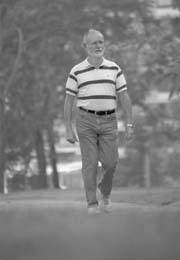
| ||
 | ||
 Retired chemistry professor James Fresco enjoys a nature walk PHOTO: OWEN EGAN |
The bliss and blues of retirement
|
SYLVAIN-JACQUES DESJARDINS | To retire or not to retire? That's a question James Fresco never really grappled with. When it came time for the former chemistry professor, who taught at McGill from 1965 to 1992, to take his leave, he says he felt like he was embarking on a second career -- a new life of leisure.
"Retirement has been a great adventure that I've embraced," says Fresco, one of about 80 McGill faculty and staff who choose to retire every year. Since leaving the University, the 72-year-old dynamo swims three times a week to stay fit, downhill skis throughout the winter in places like Whistler, B.C., hikes in the country and will soon take an eight-day trek through the European Alps. "I like the freedom retirement provides and that I've been able to do all that I want to do," Fresco continues, noting his spare time and excellent health have allowed him to travel to parts of South America and Europe in the last six years. "I would recommend retirement to one and all who are considering it." Rolf Sattler, 62, agrees. "Retirement has been very good for me," says the former McGill biology professor, who was named professor emeritus last June. "It's allowed me to lead a more spontaneous life." Sattler, who taught at the University from 1964 until 1997, says that when he was offered a chance to take early leave, he seized the opportunity. "I felt I needed a change in life," he says. And change he got by trading his days of research, teaching and commuting from his St. Bruno home for a care-free condo in Kingston, Ontario, near a nature preserve, where he canoes, swims, or goes for a hike everyday. Although Sattler says he loved teaching at McGill, and would have liked to have stayed on longer, he stresses, "You can't go on forever." But he admits that he re-immerses himself into academia once in a while by giving workshops and lectures, "here and there." Retirement, he says, has allowed him the opportunity to think of himself. "To turn my attention to what I'd neglected," he says, like sports, meditation and pleasure reading. "I can read whatever I feel like reading now," he adds, noting he can spare time to dig into books on poetry, spirituality and politics -- subjects he rarely had time for when he worked. Brenda Parsons, 62, says that while she enjoys retirement, it is not without its drawbacks. The former communications officer for McGill Admissions, who retired in 1996 after 27 years of service that included periods as communications officer for Martlet House and as administrative assistant for the Graduate Program in Communications, confides that she often misses her old job. "It's a strange sensation," she notes about not heading back to work every day. "It's a bit of a shock to the system since I really enjoyed what I was doing at McGill." And being on a pension, she says, has restricted her spending as well: "I find it very difficult adapting to a reduced income." But, Parsons adds, the secret to overcoming the retirement blues is to remain active. "To give yourself a reason to get up every morning," she emphasizes. For her part, Parsons has taken several trips (to Barbados, Costa Rica and France), actively paints (watercolours to acrylics) and sings in a choir. "I'm a bit hyperactive," she admits of her need to remain busy. "I always need to immerse myself in something." Another way she has kept active was renting herself a summer cottage in Georgeville for the past three years and enrolling in a two-year art program at the Saidye Bronfman Centre. "It's great because the program doesn't require exams," she confides, noting she had her fill of academic pressure while completing her undergraduate and master's degrees in communications at McGill as she worked full time, too. Gavin Ross, who retired as executive director of McGill's Alumni Association in 1996, after 21 years, says it is essential people prepare themselves before retiring by becoming involved in clubs or developing hobbies to remain active. The 64-year-old says that he keeps busy as a freelance consultant for other university alumni associations, traveling whenever he can, being honorary president of the McGill hockey team and doing volunteer work for the University's student rugby team and debating union. He even took up golf before retiring. "Which I play badly," he admits with a chuckle. Yet, even with all his activities, Ross acknowledges that he misses his old job, too. "My work was very consuming," he says. "McGill was sort of my life. I had a high profile job, where I would meet many people and all of a sudden, after retiring, I was cut right off." Ross says that since nearly 140 faculty and staff retired in the summer of '96 -- an unusually high number encouraged by an early retirement package McGill offered to improve its bottom line -- he would be most grateful if the University was to organize a special reunion for these former colleagues every five years. "It would be nice to catch up and find out what everyone's been up to since we said goodbye," he says. Indeed, many retirees believe McGill doesn't do nearly enough to help them maintain their links to the University. In a recent message sent to the Reporter, one recent retiree declared, "McGill does an abysmal job of keeping pensioners in the family." Still, there is something to be said for life after McGill. While Ross misses having a set routine every morning, he allows that not having a job does have its advantages. "If I'm tired and don't want to get up," he says, "I can always roll over and go back to sleep."
|
|
| |||||